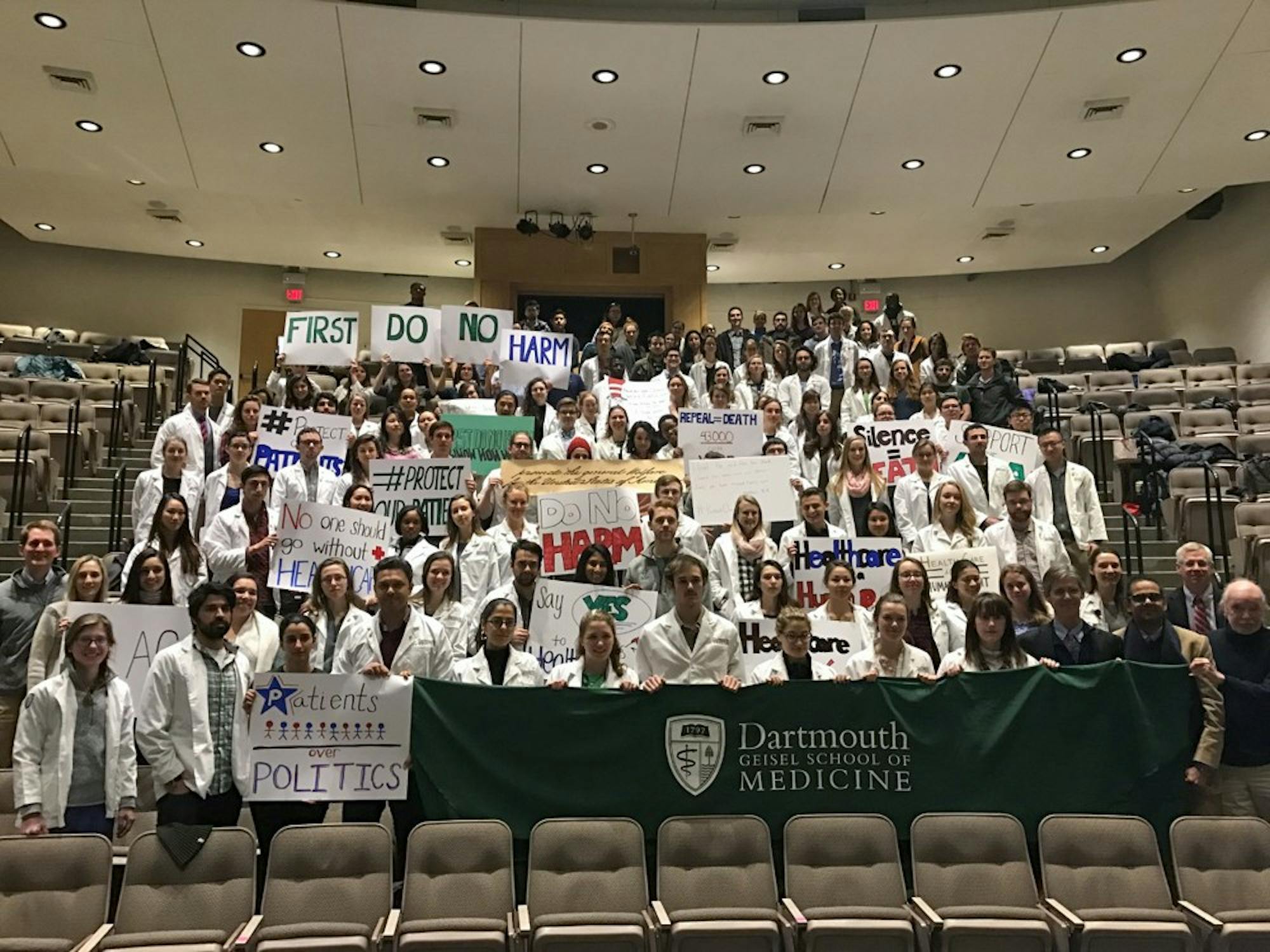On Monday, students and staff attended the “Dartmouth Protect Our Patients Vigil” at the Geisel Medical School’s Kellogg Auditorium. The gathering was one of several organized by Protect Our Patients, an online group of about 2,000 medical school and masters of public health students that advocates for healthcare access for all Americans. The event focused on patient-centered advocacy efforts against the repeal of the Patient Protection and Affordable Care Act, engaging medical students, clinicians and staff in tandem with larger hospital organizations.
The ACA, commonly referred to as Obamacare, is a piece of legislation introduced by the Barack Obama administration that implemented several healthcare reforms, including new benefits, patient protections, rules for insurance companies, taxes, tax breaks, funding, spending, education and new job creation. These reforms also aim to slow healthcare spending in the United States. However, congressional Republicans promised to repeal and delay further implementation of the Affordable Care Act under the recently elected Donald Trump administration.
Event organizer Anne-Laure Dassier Med’16 said that the repeal of the ACA will increase the number of uninsured Americans by 18 million in the first year alone, and by 32 million over 10 years.
The event was also organized by Megan Rose LaPorte Med'17, Natalie Ring Med'18 and Tara Kedia Med'18.
During the event, director of the Dartmouth Institute for Health Policy and Clinical Practice and professor of medicine at Geisel Elliot Fisher discussed the potential ACA repeal, its effect on patients and future patient advocacy at Geisel. Fisher contributed to the development of bipartisan ideas in the Affordable Care Act, working in the George W. Bush and Obama administrations on health care reform. His ideas regarding the reformation of the healthcare market and delivery were expected to slow the growth of healthcare spending while improving the quality of care that Americans received.
“The idea is that accountable care organizations will build upon the rewarding of medical groups, hospitals and physicians in ways that allow them to improve care while lowering costs,” Fisher said. “If they lower the growth of healthcare spending and improve care for the patients they serve, they would be eligible to keep some of the savings. There are now 860 accountable care organizations in the United States and over 20 million people are getting care under them.”
Republicans are committed to effective market-based approaches to improving care for the public, but coverage expansion programs are threatened under the repeal, Fisher said.
“I think the ACA definitely has some flaws, but it is doing good for patients around the country,” Alex Doering Med’20 said. “And I think that repealing is much more of a power play and a show than actual meaningful change in the country.”
Fisher said that structural changes to the insurance market that have been proposed by Trump’s administration would especially threaten the coverage of those who are already sick, have a chronic medical condition or are poor.
“The wonderful thing about the current way the health insurance market was expanded is that it requires health insurers to accept all patients without any exclusions related to prior medical conditions,” he said. “The great concern of the potential repeal of the Affordable Care Act is that it would take away the capacity of insurance companies to provide care to all patients.”
Natalie Ring Med’18 said she participated in the protest because it is a practitioner’s responsibility to care about their patients, including those patients who potentially cannot come to them because they do not have insurance.
Reza Hessabi Med’20 said that part of being a physician is advocating for the health of one’s patients, not just working with them in the exam room, and that participating in the gathering was one way of doing that.
“We’ve seen in lots of different states that the ones who are slow to roll out Medicaid or expand access to healthcare services have much higher preventable deaths, excess mortality and poor health outcomes ... This is an impending public health crisis – the potential repeal of the ACA and rollback of health services for the most marginalized and vulnerable among us.” Jake Perlson Med’20 said.
Correction Appended (February 1, 2017):
This article has been appended to include all of the organizers of the event in addition to Anne-Laure Dassie.
A quote by Perlson was revised on Feb. 1 for factual accuracy and clarity.
Alexa Green is a junior from Boca Raton, FL. She is majoring in English, with minors in Arabic and Public Policy. After joining the newspaper her freshman winter, she served as a beat reporter covering Hanover & the Upper Valley. Following this position, Alexa became the associate managing news editor. Outside of the newsroom, she is a tour guide on campus, works for the Rockefeller Center for Public Policy, and conducts research in the English department. During her off term, Alexa worked for I.B.Tauris, an independent publishing house in London, U.K., editing and publicizing international relations and politics books. She is passionate about the ways in which policy, current events, history and journalism have interconnected roles in defining global issues.




